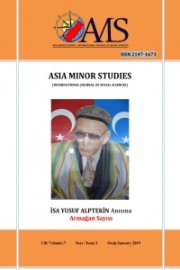MERSİN-SİLİFKE YÖRÜK KÜLTÜR HAYATINDA KÜL
THE CONCEPT OF ASH IN MERSIN-SILIFKE JURUKS’ CULTURAL LIFE
Author(s): Mehmet AlptekinSubject(s): Anthropology, Cultural history, Human Geography, Ethnohistory, Social history, 6th to 12th Centuries
Published by: Kilis 7 Aralık Üniversity
Keywords: Silifke; Juruk; Culture; Ash;
Summary/Abstract: Juruks are also known as a nomadic Turkish tribe that live by husbandry and they usually live around Taurus Mountains. The term “Juruks” also refers to nomadic Oghuz tribes (the Turkmen) who arrived and settled in Anatolia. Taurus Mountains are the home for several highlands and pastures, they have high altitude and convenient conditions for Asian style living. That’s why they have become the primary living quarters of the Turkmen who came to Anatolia since the XI the century. Silifke district of Mersin (İçel) province has the favourable climate and geographical features in which Juruks can breed their animals and carry on with their other labor. The district also hosts numerous nomad groups such as Bahşiş, Döneli, Menemenci, Sarıkeçili and Tekeli. The cultural values of Central Asia brought by the nomads are still quite alive across this territory. Ash has a cleansing property. Taking this into consideration, the study examined its place and importance in various implementations starting from its production phase based on the examples attained from Mersin-Silifke Juruks. This way, the importance of ash which was once a must of a certain period in the cultural life was emphasized.
Journal: Asia Minor Studies
- Issue Year: 2019
- Issue No: 1
- Page Range: 34-45
- Page Count: 12
- Language: Turkish

